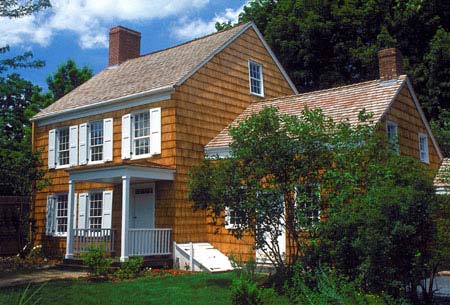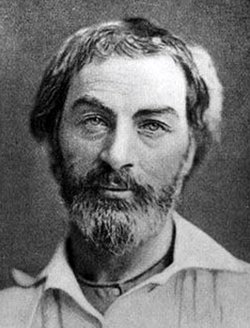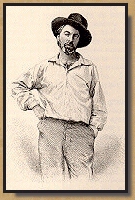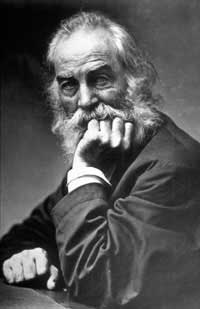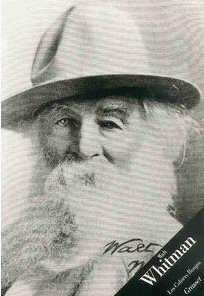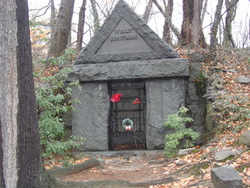Notes for WALT WHITMAN, JR:
Son of Walter and Louisa (Van Velsor) Whitman, Sr.
Born: May 31, 1819 in West Hills, Huntington Township, Suffolk, New York.
Died: March 26, 1892 in Camden, Camden County, New Jersey.
Buried: March 30, 1892 in Harleigh Cemetery, Camden, Camden County, New Jersey.
Never married.
NOTES
His mother was barely literate, and his father was a friend of Thomas Paine. Whitman was taken out of school at the age of 11 to help support the large family. He learned the printer's trade, which began a life-long love affair with reading and the written word. He was mostly self-taught, but knew the Bible thoroughly, and was fond of Shakespeare, Homer and Dante. He became a teacher in 1836 at the age of 17, and continued to teach until 1841, when he turned to journalism as a full-time career. While briefly serving as editor of the "New Orleans Crescent" in 1848, he witnessed the cruelty of slavery at the New Orleans slave markets. He became an abolitionist, and upon returning to New York founded the free-soil newspaper the "Brooklyn Freeman". He wrote "Leaves of Grass" in July of 1855 and so astonished Ralph Waldo Emerson that he wrote to Whitman to say "I had to rub my eyes to see if the sunbeam was no illusion." Two of Whitman's more famous poems are "When Lilacs Last in the Dooryard Bloomed" and "O Captain! My Captain!". During the Civil War he served as a volunteer nurse. Whitman continued to edit, revise, and reissue "Leaves of Grass" throughout his life.
WALT WHITMAN ON LONG ISLAND (PAUMANOK)
"Long Island was settled first on the west end by the Dutch, from Holland, then on the east end by the English - the dividing line of the two nationalities being a little west of Huntington, where my father's folks lived, and where I was born." "The later years of the last (19th) century found the Van Velsor family, my mother's side, living on their own farm in Cold spring, Long Island, New York State, near the eastern edge of Queen's County, about a mile from the harbor."
FROM CORNELIUS TO LOUISA TO WALT
"No one could have seen her (Louisa Van Velsor: and her father Major Kale (Cornelius) Van Velsor, either in their prime or in their older age, without instantly perceiving their plainly marked Hollandish physiognomy, color, and body-build. Walt Whitman has all of it; he shows it in his old features now his full flesh and red color."
- Walt Whitman's Notebooks and Unpublished Prose Manuscripts page 28-9.
THE DUTCH INFLUENCE
"The Van Velsors, (Walt's mother's father) were pure Low Dutch, of the third or fourth remove from the original immigrants. Few realize how this Dutch element has percolated into our New York, Pennsylvania, and other regions not so much in ostensible literature and politics, but deep in the blood and breed of the race, and to tinge all that is to come. Like the Quakers, the Dutch are very practical and materialistic and are great money-makers, in the bulk and concrete of the ostent of life but are yet terribly transcendental and cloudy too. More than half of the Hollandish immigrants to New York Bay became farmers, and a good portion of the rest became engineers or sailors."
- Walt Whitman's Notebooks and Unpublished Prose Manuscripts page 29
Walt Whitman is commonly acknowledged as "America's Poet." He saw himself as "born here of parents born here from parents the same, and their parents the same. Both were totally "American". He was the second of seven surviving children of Walter Whitman and Louisa Van Velsor. His family moved to Brooklyn, New York in 1823. The marquis de Lafayette visited Brooklyn and embraced the small Walt Whitman out of a crowd in 1825, which he took as a good omen. He learned the printing trade on the Brooklyn Patriot & Star. Early in his career, he used the pseudonym "Velsor Brush", joining the maiden surnames of his maternal and paternal grandmothers. Starting in 1849, he worked as a printer, freelance journalist and house builder and published four poems, which would later appear as "Leaves of Grass", only a dozen copies of which were first printed in 1855. In 1856, Henry David Thoreau and Bronson Alcott visited him in Brooklyn. Ralph Waldo Emerson's extremely positive review of "Leaves of Grass" helped to gain it notoriety in literary circles.
Whitman was a strange sight wandering the streets of Brooklyn with his long, flowing white beard, tall 6'1" frame and eccentric manner. He described himself as of "pure American breed, of reckless health, his body perfect, free from taint from top to toe, free forever from headache and dyspepsia, full-blooded, six feet high, a good feeder, never once using medicine, drinking water only - a swimmer in the river or bay or by the seashore." Amos Bronson Alcott described him as "broad-shouldered, rouge-fleshed, Bacchus-browed, beard like a satyr, and rank. He wears his man-Bloomer in defiance of everybody." His works and his manner created a wide diversity of opinion. He became the object of ridicule and of encomiums, both in Europe and America. The so-called "Whitman Cult" had its origin at this time and acquired an ever-widening coterie. During the American War Between the States, Whitman served as a nurse predominantly in Virginia and Washington D.C. exposing himself to pneumonia, typhoid, malaria and patients pallid with diarrhea. After the war, he published Drumtaps, containing the famous burial byron of President Abraham Lincoln, "O Captain! My Captain!", as well as "When lilacs Last in the Dooryard Bloomed".
Whitman suffered a stroke in 1873 which resulted in some paralysis. His general health had been greatly impaired from his hospital service during the war. After 1879, he lectured in many cities on the death of Lincoln. Anne Gilchrist, an English author and widow of William Blake's biographer, published "A Woman's Estimate of Walt Whitman:, a feminist defense, in the Boston Radical in 1870. He began to receive considerable income from the sale of his books, and subscriptions from friends both in England and America. In 1890, Whitman designed a tomb based on a William Blake engraving and supervised its construction in Camden's Harleigh Cemetery. He died on March 26, 1891 at his Mickle Street home in Camden, New Jersey and was buried on March 30th. He left the injunction that the tomb door at Harleigh Cemetery should be left ajar at twilight so his spirit could stroll abroad.
WALT WHITMAN, "AMERICA'S POET" TALKS ABOUT BASEBALL "AMERICA'S GAME"
Walt Whitman wrote elegantly and prophetically about the great American game of baseball… "In our sundown perambulations of late, through the outer parts of Brooklyn, we have observed several parties of youngsters playing 'base', a certain game of ball. Let us go forth awhile and get better air in our lungs. Let us leave our close rooms. The game of ball is glorious." (The Brooklyn Eagle - 1846)
"I see great things in baseball. It's our game, the American game. It will take our people out of doors, fill them with oxygen, give them a larger physical stoicism, tend to relieve us from being a nervous, dyspeptic set, repair these losses and be a blessing to us."
"It's our game. That's the chief fact and connection to it. America's game. As the 'snap, go, fling' of the American atmosphere. It belongs as much to our institutions, fits into them as significantly as our constitution's laws - is just as important in the sum total of our historic life."
Baily and Sarah's Broome Street residence is where Walt Whitman, Sarah Margaret Fuller, Charles Anderson Dana and Horace Greeley collaborated many times as their guests. In fact, there was a small literary and philosophical coterie which met regularly at the Broome Street residence in the mid 1840's. Fuller was the editor-in-chief of the transcendentalist magazine, "The Dial", one of the most important periodicals in American literary history, and a writer of literary criticism for the New York Tribune from 1844 to 1846. Her book "Papers on Literature and Art" in 1846, grew out of her contributions to the Tribune. Dana was a writer for "The Dial" and managing editor of the New York Tribune. Greeley was the founder of the Tribune, at the time boasting the largest daily circulation in America. Walt Whitman lived in Manhattan until 1845 while working for a number of newspaper in the city.
Upon hearing that his brother George had been wounded, Walt Whitman hastened to Virginia and remained as a voluntary aid and nurse in the army hospitals there and in Washington, D.C., from 1862 to 1865.
One of the primary reasons that Walt Whitman moved to Camden, New Jersey late in life was that his brother George was living there at 322 Stevens Street working as a pipe inspector starting in 1869.
(Notes- World Almanac 1990 has year of death as 1892)
Sites:
http://www.liglobal.com/walt/
http://www.iath.virginia.edu/whitman/
